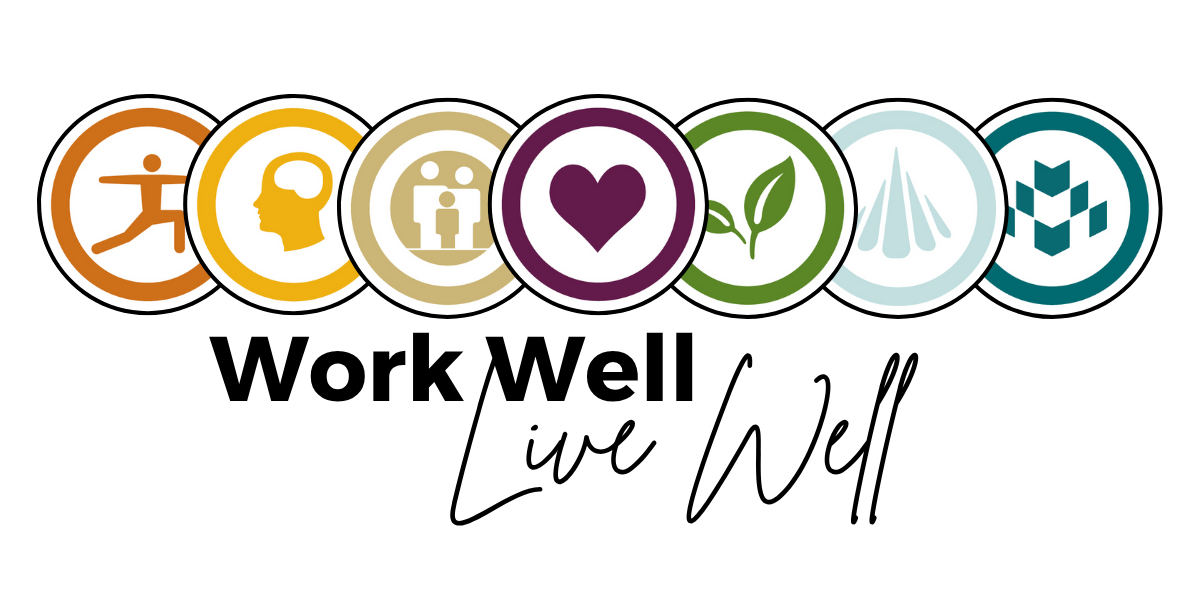
Work Well, Live Well, the wellness program for the College of Health and Human Services, aims to promote and enhance the overall health and well-being of employees.
Our Mission
The wellness program aims to improve the well-being of employees through healthy lifestyle choices and creating a culture of wellness within the college by:
- Promoting healthy choices
- Educating about dimensions of wellness
- Increasing awareness of factors that contribute to well-being
- Empowering individuals to take responsibility for their own health
- Creating an environment of well-being
Contact us for questions at hhs@southernct.edu.

Well-being Journey: Promoting a Happy and Healthy Work Life
Get Moving
Regular physical activity is essential to your physical and mental health. Exercise has incredible benefits, including elevated energy levels, increased happiness, reduced risk of chronic disease, better sleep quality, and improved brain health.
How to Incorporate Exercise into Your Work Life
- Opt for Walking Meetings: Instead of confining meetings to the office, consider suggesting a walking meeting around campus or outdoors.
- Make Use of the Campus Fitness Center: Incorporate visits to the campus fitness center into your routine before or after work hours.
- Embrace a Standing Desk: Switching to a standing desk can engage more muscles and increase calorie burn during your day.


Clear Your Mind
Engaging in meditation redirects your focus from distracting thoughts, enabling you to concentrate on the present moment. This practice not only promotes mental clarity but also fosters a deep sense of inner peace and relaxation.
During Your Workday...
- Take a 10-minute break to relax.
- Step out of your office.
- Take a leisurely walk and appreciate nature.
- Relax with a 5-minute meditation.
- Try the 4-7-8 breathing technique for relaxation. (Inhale for 4 counts through your nose, hold for 7, and exhale for 8 through your mouth.)
- Greet a colleague with a friendly “hello”.
Prioritize Quality Sleep
The quality of your sleep plays a vital role in your overall health. It is advised to aim for seven to nine hours of sleep per night. Adequate sleep enhances memory, boosts creativity, enhances focus, lowers the risk of depression, and strengthens your immune system.
Tips for a Peaceful Night's Sleep
- Eat 2-3 Hours Before Bed: Eating or drinking before bed can lead to discomfort when trying to sleep.
- Relax Before Bed: Engage in activities like taking a warm shower, reading, or meditating to calm your mind and improve your ability to fall asleep.
- Remove Distractions: Keep your phone and electronics out of the bedroom to create a more peaceful sleep environment.
- Stick to a Schedule: Maintaining a regular bedtime routine helps guarantee you receive adequate rest every night.


Eat Well
A healthy diet is essential for good health and nutrition. It protects you against many chronic diseases, such as heart disease, diabetes, and cancer. Eating a variety of foods and consuming less salt, sugars, and saturated and industrially-produced trans-fats are essential for a healthy diet.
Tips for Eating Healthy
- Eat lunch outside.
- Embrace a balanced diet.
- Stay hydrated.
- Plan your meals.
- Eat healthy snacks.
- Limit processed foods.
- Engage in mindful eating.
Self-Reflection
Self-reflection allows us to pause and examine our thoughts, actions, and emotions, providing insights that can lead to meaningful change. Through self-reflection, we gain a deeper awareness of our strengths and weaknesses, identify patterns in our behavior, and uncover the motivations behind our choices.
How to Self-Reflect
Ask Yourself Questions: Reflecting on personal questions can provide you with clarity and direction, helping you navigate your journey with purpose and intention.
- Start Journaling: Writing can be a powerful tool for self-reflection and personal growth. Whether it's capturing your daily experiences or expressing your emotions, journaling offers a space to articulate your innermost thoughts.
- Set Goals: Identify what you want to achieve, whether it's in your personal life, career, or hobbies. Make sure your goals are specific, measurable, achievable, relevant, and time-bound.

